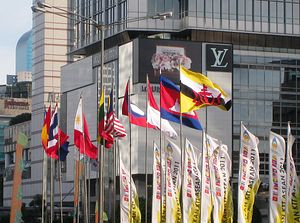On February 23, Australian Prime Minister Malcolm Turnbull and New South Wales Premier Gladys Berejiklian announced that an ASEAN-Australia Special Summit will be held in Sydney in 2018. The visit will provide both sides with a valuable opportunity to boost their relationship.
Special summits are nothing new for ASEAN and its ten full dialogue partners – Australia, Canada, China, the European Union, India, Japan, New Zealand, Russia, South Korea, and the United States. In 2016, the grouping held one with Russia in Sochi in May and one with the United States in Sunnylands, California in February. But should this summit be held in 2018, it would be the first of its kind with Australia, which is ASEAN’s oldest dialogue partner.
The idea of an ASEAN-Australia Special Summit is also not new. Turnbull had publicly issued an invitation to such a summit at the first ASEAN-Australia dialogue in September 2016, which was held in the Lao capital of Vientiane. At the time, Turnbull said that following a biennial pattern, the next summit would be hosted on Australian soil sometime in 2018. With the recent announcement, we now have a clearer sense of the when and where.
As with most special summits of this ilk, the focus of the meeting will be on how to strengthen the relationship between the two sides, which was elevated to a strategic partnership in November 2014 during the 40th anniversary of their ties. This will be discussed at the Leader’s Summit and Retreat that will form the centerpiece of the summit. Both sides will be able to take stock of the relationship and various metrics for progress, including the plan of action they adopted to implement the strategic partnership from 2015 out to 2019.
Issue-wise, there is no surprise that security and economics will dominate deliberations, since both sides have a lot invested in these realms. For instance, ASEAN is Australia’s third largest trading partner, and Australia has played a key role in helping Southeast Asian states to counter violent extremism, including terrorism financing. To underscore the importance of the security and economic dimensions of ties, two major side events will be held in addition to the Leaders’ Summit and Retreat: a business summit bringing together leaders of industry and small and medium enterprises (SMEs), and a counterterrorism conference.
While economics and security will dominate the summit, people-to-people ties will also be discussed. In part due to their geographic proximity, this dimension is already a significant one, which has even further potential for growth. For example, in 2016, ASEAN accounted for about half of all Australian students who studied in the Indo-Pacific. Australia has rolled out some new proposals in recent years, signalling its commitment to this area of relations, such as the New Colombo Plan and the ASEAN-Australia Council. After all, as Turnbull himself admitted at last year’s ASEAN-Australia dialogue, the benefits of close personal links between the communities of both sides cannot be measured by the conventional economic and security yardsticks alone.

































